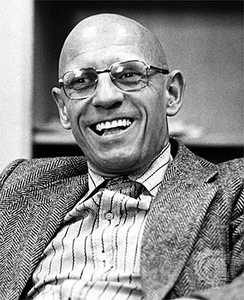‘Limits’ Of Imagining The Pandemic Present
3 CommentsIn 1984, Michel Foucault, the French historian (or) philosopher, associated with the structuralist (or) post-structuralist movement, extensively commented [i] on the German Philosopher Immanuel Kant’s ‘Was ist Aufklarung?’ (What is Enlightenment?). Thus, two hundred years hence, Foucault knocked at the limits of moments we live through. For him, Kant is responding in the Berlinische Monatsschrift (Berlin monthly, 1784- November), a late enlightenment mouthpiece, on what should be the attitude to present.
The moment we live in was, for Kant, neither a distinct era, not a transition, but rather a grand exit (Ausgang). For Kant majority of human beings, in the time he wrote in (1700s end or 1800s beginning as the case may be), carried on their everyday life with the church and monarchy setting the rhythms. The autonomy to break the rhythm or to think about the present, and thus make the exit, was difficult then, as it is now. For Foucault Kant was to work on the ‘limits’ of the rhythm and the everyday in order to ‘Ausgang’ and reflect on what he was part of.
With the coordinates of daily rhythms overwhelmingly set by the virus and its trajectories, it has become even tougher to separate ourselves from the contingent contexts we are thrown into everyday. The possibility of thinking separate from the frames we are set against, and reflecting on our ‘makes’, will determine not only how we reflect on the times we live in, but also the way we live out.
People across space and time have transformed to cyborgs – the sciences; technological artifacts; institutional orders; as well as disseminations of knowledge literally imbricate lived lives. Risk societies, urban informalities, everyday precarities, techno-social deployments, or surveillance and pastoral orders have scaled our skins and rewired our bodily rhythms. The cyborg identities in their everyday relationship with other cyborgs, with differential make-ups determine the truth orders that govern.
Foucault comes back to haunt the ‘pandemic orders in the making’ prompting an engagement with the limits. Nothing short of a critical ontology of the cyborgs we are, deployed and networked across space and time, by the political every day, can achieve this. Only this can translate into a possibility or impossibility to imagine the limits that are imposed on us by the political systems, exaggerated by the pandemic.
The possibility of knocking at the limits for instance, might come at best as a tragic reflection during the physical ejection of the urban migrant labourer in India from the metropolis. This is not quite an exit and neither does one see the space or time to reflect on the exploitative order that had appropriated him/her along with millions of others as urban cyborgs. A Lebanese Druze leader who has seen the end of a world war, been through a three month war, or the civil wars; still might only see at best an end of the world because the pandemic has only added on to the noise of everyday violence and earth shattering explosions. The fortified corona shelters that the bus bays have transformed into in a hyper vigilant South Korea or a health care regime that fell apart on the corporate altars in the United States also differentially reduce the space of reflection or eventual exit. A self righteous regime like the one in Brazil that would rather bank on military men than people of science; or the celebrations of self sufficiency (atmanirbhar in the Indian state context) when possibilities of social welfare gets precluded; also talk of the times that give no space for exit-thoughts or possibilities for reflection.
In order to critically reflect on the pandemic everyday and eventually for life to live itself out, there is no other way than exposing the conflicts and contradictions inherent to the orders people live in. There is no other way than to reflect on the ‘fixes’ put forward as part of the ‘presents’. Michel Foucault prompts us to knock at the limits once again. The task for the more privileged in places that still maintain social contracts with populations is to think with Foucauldian ‘dispositives’. These are the institutional, administrative, and knowledge structures that both maintain the systems in place and the homeostasis of the cyborg selves we all are. It is only by thinking through the links between practices, and institutional techniques deployed way before pandemics, but enhanced and perpetuated by the virus; that the cyborgs can get deconstructed across places readying for a political present that is yet to be lived into.
Note
[i] What is Enlightenment? in Rabinow (P.), ed., The Foucault Reader, New York, Pantheon Books, 1984:32-50.
Mathew A Varghese, SIRP, Mahatma Gandhi University [Previously Researcher at University of Bergen/ UKZN]
You May Also Like
Comments
3 Responses to “‘Limits’ Of Imagining The Pandemic Present”
Leave a Reply









September 2nd, 2020 @ 1:20 pm
Thank you Mathew for this insightful article.
September 15th, 2020 @ 6:48 pm
Bringing back Foucault for understanding the present within the present. This article is relevant and futuristic for the present times.
September 16th, 2020 @ 4:55 am
An eye to the precent situation.